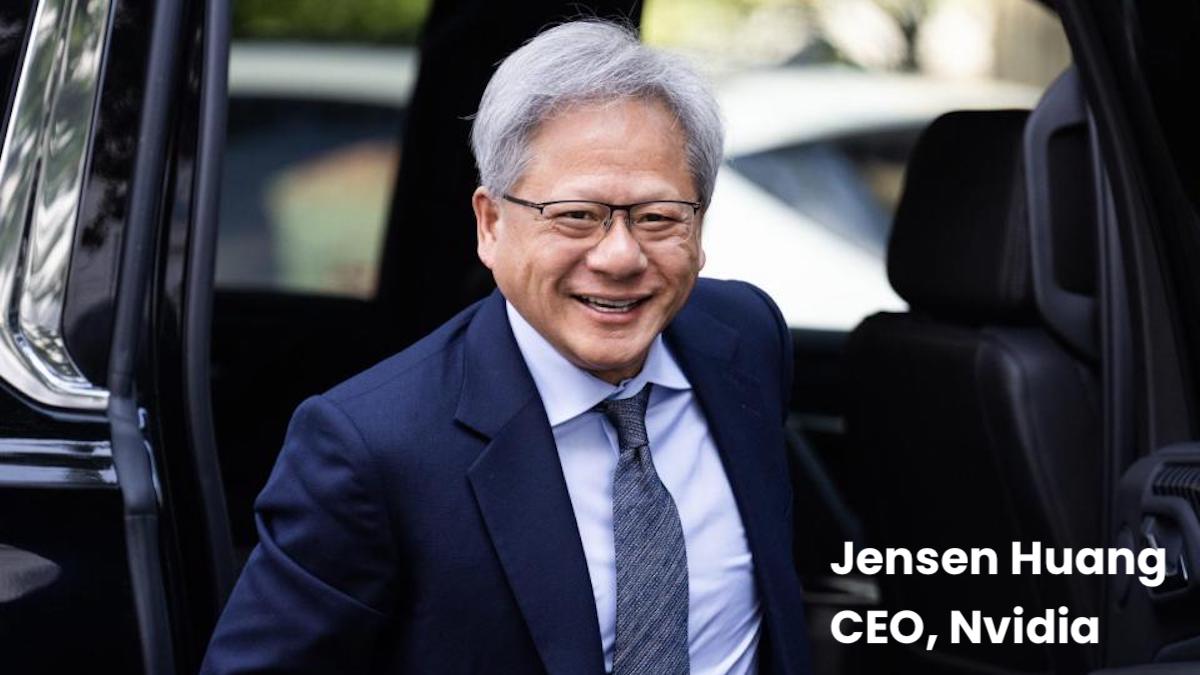Fortune. How Nvidia’s billionaire CEO went from Denny’s dishwasher to leading a company with a $2 trillion market cap.
By Sydney Lake
Tue, Mar 12, 2024, 11:42 AM PDT4 min read
Jensen Huang was once Denny’s “best dishwasher.”
“I planned my work. I was organized. I was mise en place,” Huang said during a recent interview with Stanford Graduate School of Business. “I washed the living daylights out of those dishes.”
Now he’s beating the living daylights out of the competition as president and CEO of Nvidia, the world’s premiere advanced chip manufacturer. He’s now worth nearly $82 billion, and the company he cofounded has a $2 trillion market cap.
But Huang attributes his wild success in business to the work ethic he picked up during his time with Denny’s as a dishwasher, before he was “promoted” to busboy.
“I never left the station empty-handed. I never came back empty-handed. I was very efficient,” Huang said. “Anyways, eventually I became a CEO. I’m still working on being a good CEO.”
How Huang cofounded Nvidia
Huang was born in Taiwan in 1963, moved to Thailand at age 5, and moved to Washington State in the U.S. when he was 9. He went to high school outside of Portland, Ore., where he started working for Denny’s at age 15, according to an Nvidia blog post. Huang then earned his electrical engineering degree from Oregon State University, then went on to get his master’s in the same subject from Stanford University in 1992.
Not only did Huang land his first job at Denny’s—but it’s also the place where he and two of his friends cooked up the idea that would make him a billionaire. In 1993, Huang, along with Chris Malachowsky and Curtis Priem (who both worked at Sun Microsystems), met at what was one of Denny’s “most popular” locations in Northern California to discuss “creating a chip that would enable realistic 3D graphics on personal computers,” according to the Nvidia blog post.
“Chris and Curtis said one day they’d like to leave [Sun Microsystems], and they’d like me to go figure out what they’re going to leave for,” Huang said. “They insisted I figure out with them how to build a company.” But with little runway on how to build a business, Huang said he resolved to visit a bookstore to find books on starting a business and found one titled How to Write a Business Plan by Gordon Bell. But the issue was the book was 450 pages long.
“Well, I never got through it. And not even close,” Huang said. “I flipped through a few pages and I go, ‘You know what, by the time I’m done reading this thing, I’ll be out of business.” So with that, Huang took to a Denny’s booth with his two friends to brainstorm a business.
At the time, Huang was working as an engineer with LSI Logic, a company in Santa Clara, Calif., that sold semiconductors and software. Avago Technologies acquired LSI Logic for $6.6 billion in 2014. But Huang kind of skips over that part when he’s telling his career story.
“My first job before CEO was a dishwasher,” Huang said in the Stanford interview. “And I did that very well.”
While at Denny’s that fateful night, Huang, Malachowsky, and Priem “polished off a Lumberjack Slam, Moons Over My Hammy, and a Super Bird sandwich—washed down with plenty of coffee,” according to Nvidia, the perfect fuel for masterminding a new technology. Now there’s a booth dedicated to Huang at an East San Jose Denny’s location.
“The PC revolution was just getting going,” Huang said in the Stanford interview. “We thought, why don’t we build a company that solves problems that a normal computer that is powered by general purpose computing can’t. That became the company’s mission.” Some of the industries “opened up,” Huang said, as a result of Nvidia’s technology, include computational drug design, weather simulation, materials design, robotics, self-driving cars—and the big one: artificial intelligence.
Nvidia’s technology “enabled a whole new way of developing software where the computer wrote the software itself—artificial intelligence as we know it today,” Huang said. “That was the journey.”
Huang’s leadership advice
While Nvidia has undoubtedly been developing the technology fueling the AI revolution, it had done so relatively quietly until just about a month ago. But in mid-February, its 46% stock surge pushed it past Amazon, adding about $560 billion in market value. Then Nvidia beat out Alphabet to become the third most valuable U.S. company. But there are some skeptics who think Nvidia may be overvalued. Apollo Global Management said that Nvidia’s inflated earnings are creating an AI bubble even “bigger than the 1990s tech bubble.”
But even as successful as Nvidia becomes, Huang consistently reflects on his humble beginnings. He tries to maintain a very flat structure at his company and lends a helping hand where he can. He says (counter to conventional business wisdom) that a CEO should have the most direct reports; he has 50.
“No task is beneath me,” he said. “I used to be a dishwasher. I used to clean toilets. I cleaned a lot of toilets. I’ve cleaned more toilets than all of you combined. And some of them you just can’t unsee.”
This story was originally featured on Fortune.com


